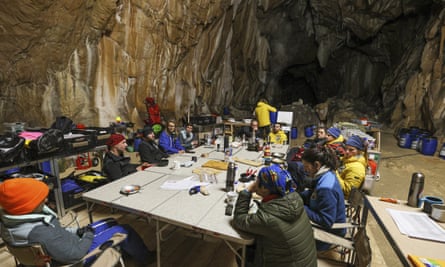Fifteen people have emerged from a cave in south-west France after 40 days underground in an experiment to see how the absence of clocks, daylight and external communications would affect their sense of time.
With big smiles on their pale faces, they left their voluntary isolation in the Lombrives cave to a round of applause and basked in the light while wearing special glasses to protect their eyes after so long in the dark.
“It was like pressing pause,” said Marina Lançon, one of seven women to take part in the experiment. She did not feel any rush to do anything and wished she could have stayed in the cave a few days longer, she said, but that she was happy to feel the wind and hear birdsong again.
She did not plan to look at her smartphone for a few more days, hoping to avoid “too brutal” a return to real life, Lançon said.

The group lived in and explored the cave as part of a project called Deep Time. There was no natural light, the temperature was 10C and the relative humidity 100%. They had no contact with the outside world, no updates on the pandemic nor any communications with friends or family.
Scientists at the Human Adaption Institute, which is leading the €1.2m (£860,000) project, say the experiment will help them understand better how people adapt to drastic changes in living conditions and environments.
As expected, those in the cave lost their sense of time.
“And here we are! We just left after 40 days … For us it was a real surprise,” the project director, Christian Clot, said. “In our heads, we had walked into the cave 30 days ago.”

One team member estimated the time underground at 23 days.
Johan Francois, a maths teacher and sailing instructor, ran 10,000-metre circles in the cave to stay fit. He said he sometimes had “visceral urges” to leave.
With no daily obligations and no children around, the challenge was “to profit from the present moment without ever thinking about what will happen in one hour, in two hours”, he said.
In partnership with laboratories in France and Switzerland, scientists monitored the 15 team members’ sleep patterns, social interactions and behavioural reactions via sensors. One sensor was a tiny thermometer inside a capsule that participants swallowed like a pill. It measured body temperature and transmitted data to a computer until it was expelled naturally.
The team members followed their biological clocks to know when to wake up, go to sleep and eat. They counted their days not in hours but in sleep cycles.
“It’s really interesting to observe how this group synchronises themselves,” Clot said earlier in a recording from inside the cave. Working together on projects and organising tasks without being able to set a time to meet was particularly challenging, he said.
Two-thirds of the participants expressed a desire to remain underground a little longer to finish group projects started during their stay, said Benoit Mauvieux, a chronobiologist involved in the research.
“Our future as humans on this planet will evolve,” Clot said after emerging. “We must learn to better understand how our brains are capable of finding new solutions, whatever the situation.”